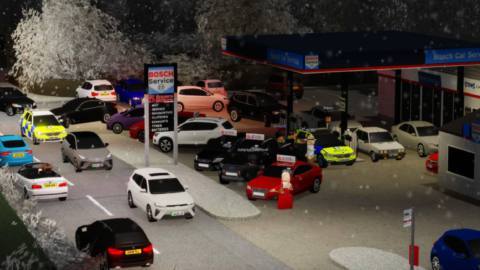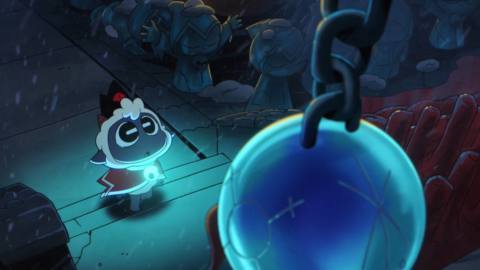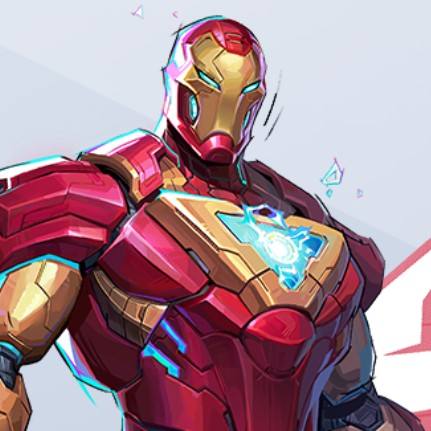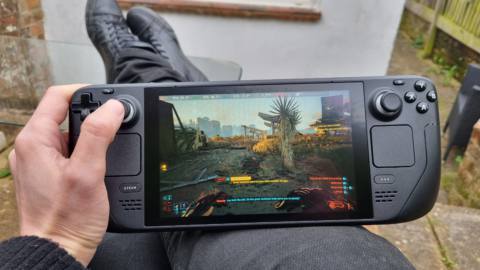Helldivers 2 is setting a new standard for live storytelling, and not a little of that is how the game's fiction has bled-over into the online interactions between Arrowhead Game Studios and the playerbase. This found spectacular expression last week after the game's first real misstep, a Sony-mandated account linking requirement, saw Helldivers collectively organise and (what else) review bomb their own beloved game on Steam in an effort to get the situation reversed.
There is something apposite in the Helldivers themselves, albeit metaphorically, hitting upon an explosive solution: even more fitting is that it actually worked. Helldivers 2 has been a huge success for Sony as a simultaneous PC release, already its seventh highest-grossing game ever in the US, and this concerted pushback clearly caught the publisher off-guard. After a brief doubling down on the requirement, Sony abandoned it: for now, at least.
The Helldivers surveyed the wreckage, and it was good. Operation Clean Up began, a community led initiative to get the game's Steam rating back to where it should be (it's now at “Mostly Positive” overall, though recent review remains “mixed”), while players generally heaped praise on Arrowhead (not so much Sony) for being big enough to reverse course. There were casualties—one community manager was unfortunately too vociferous in their support of the players' tactics, and subsequently lost their job—but disaster was averted.
I find this stuff almost as fascinating as the ongoing Galactic War itself. Arrowhead has succeeded in engaging a playerbase at huge scale, and making them feel like they have a degree of control in how this game is unfolding. Helldivers 2 players are seriously invested in this universe already and, when they're not playing the game itself, are using a myriad of out-of-game tools to track it, offer feedback, and collectively organise themselves. The fact this maps so well onto Helldivers 2's satirical themes of managed democracy and collectivism is just the icing on the cake.
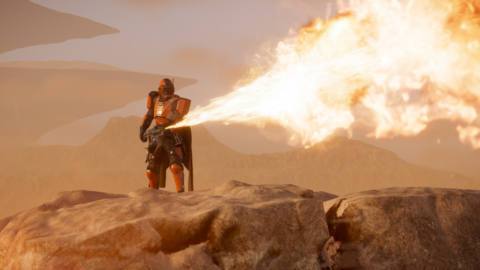
Twin polls
A major part of how Arrowhead has engaged is through the developer's forward-facing CEO Johan Pilestedt, who since launch has been active online responding to queries, addressing major concerns, and even spreading Super Earth propaganda. Pilestedt decided to follow up the account linking controversy by acknowledging “the negative sentiment”, and then offering up a hostage to fortune. The Polar Patriots premium warbond, due to release today, is a $10 DLC pack that adds new armor sets, guns, and other cosmetics. But as Pilestedt shared: “a concern from the team came up about 'is it tone deaf to release a new (paid) warbond this soon?'”
There was one solution in the world of Helldivers 2. Pilestedt offered “a real vote in true democratic fashion” with two options: one that meant Arrowhead would release the warbond as planned, and the other simply “delay release” with no further details.
The poll attracted over 180,000 responses in 12 hours, and 73.9% of Helldivers voted to have the warbond delivered on-time, thank you very much. A mere 26.1% voted to give the enemies of humanity succour.
To all the @helldivers2 out there.With the negative sentiment around account linking, a concern from the team came up about ‘is it tone deaf to release a new (paid) warbond this soon?’ and therefore we are putting it to a real vote in true democratic fashion.So please guide…May 8, 2024
“Thank you everybody for your contribution,” said Pilestedt when the poll had ended. “Democracy has spoken!”
There are different ways to view this. You could call it genius community management, with Pilestedt seemingly offering up another hairshirt moment and throwing Arrowhead on the tender mercies of its players. If the warbond got delayed by a few weeks, after all, what's the big deal? There's no huge risk here, and Arrowhead knows the respondents to a short online poll are going to be self-selecting from among the most engaged and involved players (who are also the most likely to be ravenous for new content).
But if things were this easy, other studios would have done it before. Contemporary gaming communities must be a terrifying thing for studios to deal with at times, with their capacity to respond en masse to slights, real or perceived, and even punish the game with review-bombings and other tactics. Live games in particular attract enormous passion and involvement, which is why many examples deal with their community at arm's length: getting too involved, the thinking goes, is just asking for trouble.
Arrowhead's approach, and Pilestedt's symbolic poll, is a courageous and even quixotic attempt to square the circle. Every studio says “we're listening” but so rarely does that seem to result in changes, whereas Helldivers 2 players (the most engaged ones, at least) are seeing their complaints acted upon almost in real-time, and significant decisions being prompted by their actions.
The kicker, of course, is that Helldivers 2 players now understand they have some sort of collective power, even if that is an illusion of power. A major part of why Helldivers 2 works is that the core design is not afraid of unpopular choices: friendly fire's a killer, many enemies can one-shot you, there's a god-damn invisible bug that lives on the edge of my nightmares. Arrowhead's tagline is “a game for everyone is a game for no one.” But with these last two weeks, it has displayed a populist streak and, perhaps, played to the gallery a little.
That's all well and good, and the show will go on. The Helldivers have had a taste of power in this universe, however, and will remember that when the next controversy rolls around, as it surely will. Just like Super Earth, Arrowhead needs to be careful with how it manages democracy: lest it suddenly find the citizens revolting.


